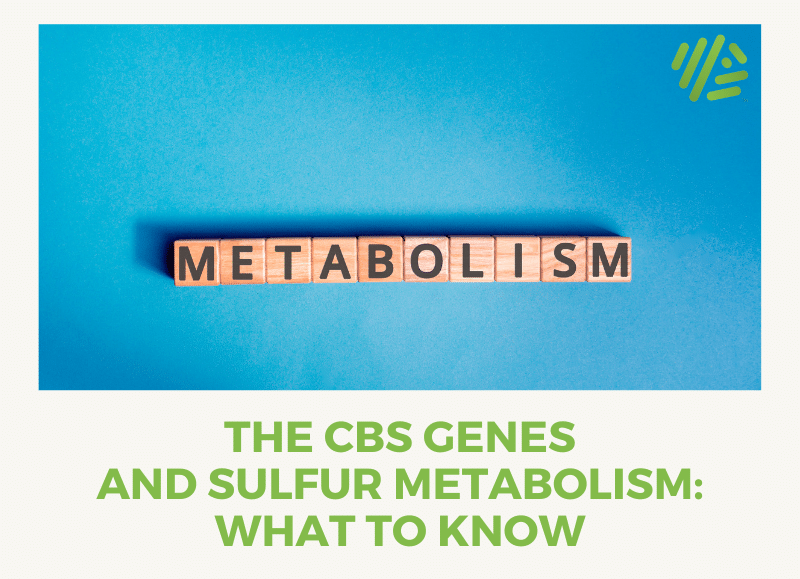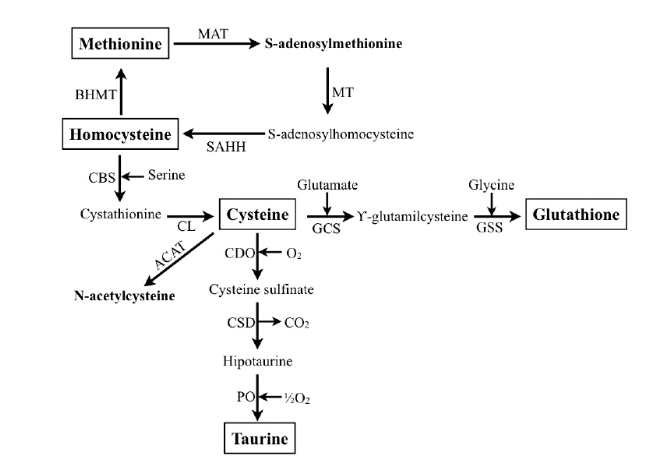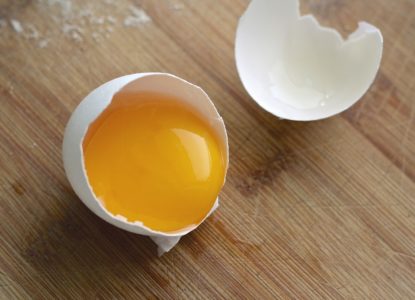The CBS Genes and Sulfur Metabolism: What to Know
Genes Mentioned

Contents
If you’ve reached this article, you’re likely researching a family of genes, called the CBS (Cystathionine-Beta-Synthase) genes in order to better personalize nutrition.
However, before I get into the meat of this post, I want to emphasize how common polymorphisms in the CBS genes are. Although the science of nutrigenomics is promising, you can’t tailor your diet or lifestyle to just one gene, so don’t make wholesale changes to your routine just based on one genetic marker.
There has been a lot of buzz about the CBS family of genes and how they impact sulfur metabolism, both from supplements like glutathione, as well as from food sources, such as cabbage, broccoli, and other cruciferous vegetables, all of which are sulfur rich. 1
For our purposes at Gene Food, we are interested in how CBS SNPs should influence food and supplement choices, if they should at all, and what lab tests can help confirm potential high or low CBS activity.
Our app reports on CBS genes, both as part of a broader methylation scoring system and with a report tied to sulfur specifically.
What are the CBS genes and what do they do?
The CBS genes make an enzyme called cystathionine beta synthase (CBS).
CBS helps convert homocysteine into cystathionine as the first step in the transsulfuration pathway. 2 You can think of the transsulfuration pathway as the complicated chain of biochemical reactions the body uses to metabolize sulfur.
As the chart below demonstrates, the transsulfuration pathway’s most important job is to help produce glutathione, a powerful antioxidant we need to stay in good health. 3

Diagram by Research Gate.
This Wikipedia article does a nice job of explaining its role of CBS in processing sulfur, which will be a key component of our dietary discussion below:
CBS occupies a pivotal position in mammalian sulfur metabolism at the homocysteine junction where the decision to conserve methionine or to convert it to cysteine via the transsulfuration pathway, is made. Moreover, the transsulfuration pathway is the only pathway capable of removing sulfur-containing amino acids under conditions of excess.
So, just as MTHFR genes convert homocysteine to methionine, CBS genes convert homocysteine to cystathionine.
They do this as part of our body’s methylation cycle, and in the process, they rid the body of excess sulfur containing amino acids.
For more on the biochemistry, check out this page, and this page.
The two extremes of CBS activity – down regulation and up regulation
To begin, it’s important to differentiate between CBS gene up-regulation, and down regulation.
Down regulation
- Down regulation, or diminished CBS activity, results in poor sulfur metabolism, the pooling of sulfur groups, and potentially high homocysteine.
- Low CBS activity is associated with diseases like homocystinuria. 4
Up regulation
- Up-regulation of the CBS genes results in rapid sulfur metabolism that can correspond with low homocysteine.
- When the CBS gene is highly active, the body cycles through homocysteine at a very rapid pace. Since the body makes ammonia as a byproduct of metabolizing sulfur, some have theorized that increased CBS activity results in higher levels of ammonia, which can cause a number of health issues. 5
The SNPs associated with CBS mutations (both slow and fast) are quite common
To help understand the effect these various SNPs can have on CBS function I’ve pooled the important data into the simple table below.
| SNP ID | Major/Minor (Risk) | Risk Allele Frequency | Risk Allele Effect |
|---|---|---|---|
| rs2851391 | C/T | 38% | High homocysteine/reduced CBS activity |
| rs234714 | C/T | 25% | No Info |
| rs6586282 | C/T | 15% | High homocysteine/reduced CBS activity |
| rs234709 | C/T | 45% | No info |
| rs234706 | G/A | 28% | Reduced homocysteine/increased CBS activity |
| rs5742905 | T/C | 0.02% | Moderate increase in homocysteine/reduced CBS activity |
| rs4920037 | C/T | 13% | Reduced CBS activity |
| rs28934891 | G/A | 0.03 | No info |
One particular “up regulated” variant of interest is rs234706 or CBS C699T which I’ll discuss in more depth below.
CBS C699T and ammonia
For a very good overview on CBS up-regulation via C699T (the gene with the most data), take a look at this article by Mark London at MIT.
Mark discusses studies that have measured homocysteine levels in C699T genotypes. Many of these studies have not shown significant decreases in homocysteine with the T allele, important because low homocysteine would be evidence of increased CBS activity.
But lost in the shuffle in many discussions surrounding CBS is ammonia, because it’s ammonia that is a byproduct of sulfur metabolism. The practical implication for the everyday person with CBS gene SNPs would seem to be not only low homocysteine, but also awareness of elevated ammonia, regardless of whether the CBS SNP actually caused the ammonia level to rise.
Keeping in mind that ammonia can be high for reasons unrelated to CBS genes, what is the best lab test to measure ammonia?
To quote Mark:
Urinary ammonia is an even less reliable method for testing for CBS upregulation. This is because most of the ammonia (NH4+) in urine is produced by the kidneys for ph regulation. The ammonia that is produced elsewhere in the body, is usually detoxified by being converted to urea, which is then excreted. This process mainly occurs in the liver, and the liver is quite capable of handling the large amount of ammonia that is produced in the body, which occurs due to the metabolization of amino acids. The liver has to be able to do this, because the nervous system can only tolerate very low levels of ammonia. Excess ammonia, i.e., hyperammonia, only usually occurs either when liver functioning has been greatly reduced, or where a genetic defect in the urea cycle exists. Only by testing serum ammonia, can such a condition be diagnosed.
In light of the prevalence of these CBS gene variants, especially C699T, which has the most science examining up regulation, it seems unlikely to me that most people should not be taking extreme measures with their diets as the result of heterozygous CBS SNPs.
If you’re concerned that up-regulated CBS activity could be an issue, you could discuss an ammonia test with your doctor.




John,
I have been doing some detective work and feel genetic SNP’S are involved. I perspire ammonia sweat, don’t tolerate sulfur bearing foods, and cannot take epsom salt baths! That said, I have not done a full panel SNP test yet, but it seems obvious that I do not process sulfur correctly. What test do you recommend and how can I treat the SNP problem?
How and where do you order test for CBO?
How do you find out about the Urea Cycle snps? I have a CBS mutation and according to an Organic OATS test, I appear to be making too much ammonia. I’m also allergic to sulfa drugs – not sure if its related. There is no question I have a problem with high thiol foods. What I’m reading here is low protein is the way to go.
I’ve been so impressed with your research, I purchased a GeneFood nutrition plan. It sadly did not pick up this aberration but did recommend only 20% protein. Would you change that recommendation, based on the problem with the CBS mutation – or unknown urea cycle snp?
Thanks. The information you provide is really helpful!
My daughter has cbs rs234706cc ,so what should she eat ,its look like down regulation ,should she avoid high sulphar veges n food or she should eat sulphar nased food ,she was foing well on chondroitin sulphate ,she also has pyrrole disorder n comt++ ,kindly help hw to handle this issue .thanx so much
If I am heterozygous for CBS C699T rs234706, should I be avoiding eggs and cruciferous vegetables, onions and garlic? I sure hope not because I love them. But I’m worried if these foods should be reduced. Many thanks!
I wonder how to do these tests? i live in Sweden and I dont think I can do them here. For many years my urine has a strong small of ammonia, No doctor know why. I also have an inflammation in my body, high ferritin and very high b12 levels although I am not taking any supplements at all. Since I have symptoms of low b12 (numb feet) I have tried injecting mekobalamin but. Got a strong allergic reaction, the area where I injected turned red and the itching was terrible. I am diagnosed with SIBO (methane). I also suffer from fatigue and have had thyroid (hypo) problems that is better after intake of herbs and eating more fruit can you recommend anything? Thank you
Hi Lena!
Many people have high B12 when they do have the MTHFR mutation, because they’re body is not able to use the B12 that is not methylated. Thus, when their body receives the non-active form, it basically collects in your bloodstream. methylcobalamin (methylated b12) is the active b12 that you should be taking if you have this mutation.
I see rs234706 G/A. If someone is GG, does that mean there is no risk on this gene?
Thank you
Hi, I was wondering why i could not find CBS A360A RS 1801181 in the article ? I have 4 CBS +/- and 2 CBS +/+ ,but don’t have C699T. And I cannot eat anyfood that is high sulfur, IF i eat like asparagus ,i will be very very sick ,brain fog, could not open eyes for 4 to 5 hours . cannot eat garlic or onion or any high sulfur food.
Ngai
Hey Ngai, thanks for your comment. We list A360A on our CBS gene page, which you can take a look at here.
I will also update this post with more rs1801181 (A360A) info and analysis.
Thanks very much for this article. I am grappling with relationship of up-regulating hetereozygous CBS mutations in connection with my broader homozygous methylation snps (MTHFR and MTR). My homocysteine is average (presumably good) so in an odd way the CBS C699t (+/-) seems to protect me from MTHFR C677t (+/+) impacts. But I have some ammonia/sulphur issues. And I love cruciferous veggies. Phooey. Your article helped. 🙂
Very interesting, thanks for reading and for commenting DJ. Glad the post helped in some small way.
Related to this question: I have a relative who like you has MTHFR, MTR nad MTRR mutations as well as an upregulating CBS mutation. The doctor s prescribed methylated B vitamins for the former issue. I understand that these same vitamins tend to increase ammonia in the body relating to the latter issue. What should one do regarding supplementation when both issues are present? Should any methylated “B” vitamins be taken under these circumstances?
EK, regarding B vitamin supplements, everyone will respond differently, however careful on dosage. Long term use of around 800mcg of methyl folate has been linked to increased cancer risk in some people. Check out this post for more details: https://www.mygenefood.com/b-vitamin-supplements-and-cancer-risk-how-to-make-smart-decisions/